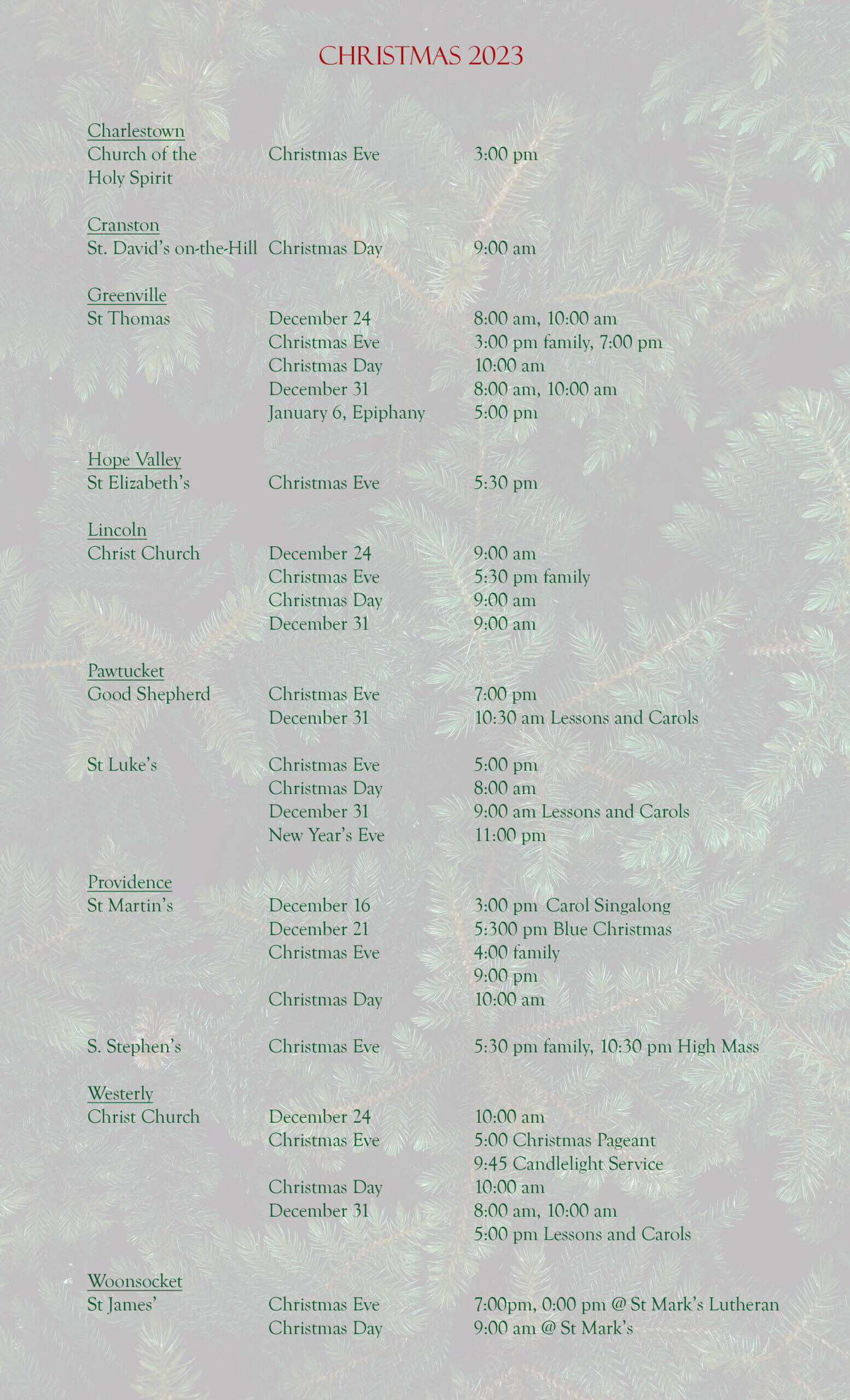A New Home
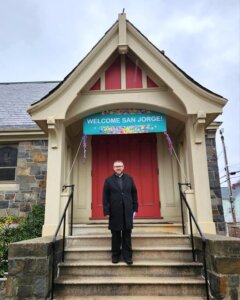
It’s no accident that the Rev. Jack Lynch and the people of San Jorge, Central Falls chose the first Sunday in Advent as the day they would become San Jorge, Pawtucket. When 92 members of the Spanish-speaking congregation gathered for their first worship service at the building they will now share with St. Luke’s, Pawtucket, they were focused not on the building they were leaving behind in Central Falls, but on new opportunities and ministry ahead. “Yo voy a empezar algo nuevo, y ya he empezado a hacerlo,” read the congregation’s Facebook page. “I am about to do a new thing; now it springs forth, do you not perceive it?” (Isaiah 43:19)
“We have more visibility in a community that is growing more diverse while continuing to serve Central Falls,” Lynch said of the move to the building at 670 Weeden Street in Pawtucket. “It is a real opportunity for evangelism.”
Last year diocesan leaders, in concert with the leaders of San Jorge, determined that the building in Central Falls where San Jorge had worshipped for decades could not adequately be repaired. Collaboration with St. Luke’s, Pawtucket, located less than a mile away, ensued, and on Sunday, the leaders of St. Luke’s welcomed the people of San Jorge warmly, with good spirits and extra signage in Spanish. The congregation includes people of 14 different nationalities, including many immigrants from Central and South America and a number of second- and third-generation Americans.
“We are excited to work with other Episcopalians in the community,” Lynch said. “Together, we can explore new ways of doing things together in a part of Rhode Island that is changing rapidly.”
Although Lynch describes response to the new location as “very, very positive,” he knows that maintaining the congregation’s longstanding holiday traditions will be even more important this year. On Saturday at 7 p.m., San Jorge will host La Fiesta de las Velitas, a traditional Colombian celebration of the Virgin Mary’s conception. The evening will include worship and a reception with hot chocolate and sweet bread, and everyone is welcome to attend.
Diocesan Cycle of Prayer 1 Advent 2023 – Last Pentecost 2024
The 2023-2024 Diocesan Cycle of Prayer is available for congregations to use in their weekly intercessions. Each congregation is prayed for during the week which includes their Feast of Title.
Morning Prayer is offered in the chapel at Diocesan House on Wednesdays and Fridays at 9:30 AM. You are welcome to attend Morning Prayer — mindful that the office is closed on holidays and some days specific to the Diocesan House.
Follow where you believe God is calling your heart
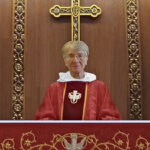 The Rev. Jo-Ann Drake, the first woman ordained to the priesthood from the Diocese of Rhode Island, wasn’t able to make the luncheon the diocesan chapter of the Episcopal Church Women hosted recently to celebrate the 49th anniversary of the ordination of women to the priesthood. But she sent a note. It read, in part:
The Rev. Jo-Ann Drake, the first woman ordained to the priesthood from the Diocese of Rhode Island, wasn’t able to make the luncheon the diocesan chapter of the Episcopal Church Women hosted recently to celebrate the 49th anniversary of the ordination of women to the priesthood. But she sent a note. It read, in part:
“On Sunday I had the joy of celebrating the 45th Anniversary of my Ordination to the Priesthood. When Bishop [Fredrick H.] Belden ordained me, he congratulated me on being the first woman priest in the Diocese. I thanked him then told him that all that really mattered was that I wouldn’t be the last.
Your gathering this day demonstrates how resoundingly God answered our prayers and affirmed our call. My thoughts and prayers are with you all and may you have a joyful and Spirit filled day.”
Drake found her way into the Episcopal Church through campus ministry programs at Rhode Island College and Brown University. Belden, a staunch advocate for women’s ordination at a time when the diocese was divided on the issue, ordained her to the priesthood on October 1, 1978, at St. Peter’s Church in Glenside, Pennsylvania, where she had been serving as a transitional deacon.
She would serve other churches in Pennsylvania and New Hampshire before returning to Rhode Island in 1993 as rector of Church of the Redeemer in Providence. Looking back on her journey, which began in a time of great uncertainty, she said recently that she “wouldn’t change a minute of it.”
Drake’s path to the priesthood began as the Episcopal Church’s sometimes fractious discernment of whether women should be ordained to the priesthood was reaching its climax. Such ordinations were not permitted when she entered Episcopal Divinity School (EDS) in the fall of 1974, yet weeks earlier in Philadelphia, three bishops had ordained 11 women in defiance of the church’s prohibition.
By the time she graduated from EDS, not only had the church’s General Convention authorized women’s ordination to the priesthood, but two of the Philadelphia 11—the Revs. Carter Hayward, Ph.D and Suzanne Hiatt—were members of the seminary’s faculty.
As the church’s discernment progressed, Drake’s did, too. She had originally felt called to teach, but her interest in ordained ministry intensified, and Belden encouraged her. “I cannot say one bad word about him,” Drake said. “He was so kind and gracious and wanted to ordain a woman in Rhode Island.”
Her path “didn’t really cross,” with Hayward and Hiatt’s, Drake said, but she appreciated their example. “I admire their courage and believe they honestly were following God’s call,” she said. “What they did was grace-filled and holy; a spiritual outpouring of God’s will and God’s love.”
While a number of her classmates were involved in women’s groups and other activities, Drake said that wasn’t for her. “I’m a bookworm and a geek,” she said. “I loved having my nose stuck in a book.”
“A lot” has changed over the course of her ministry, Drake said, particularly in the acceptance of female clergy. While Drake attended chapel regularly at EDS, several of her fellow students and the faculty chose not to attend if Heyward or Hyatt were celebrating. Some bishops would not allow their seminarians to attend.
There have also been significant changes in seminary curriculum, especially around liberation theology, which was just beginning to be studied during her years, she said.
Drake is now retired and associated with St Paul’s, Pawtucket where “I do as much for them as I can,” running the website, contributing to workshops, programs, and quiet days online, and celebrating the Eucharist on occasion. She does interim and supply work, telling the congregations she visits: “I’m here to share the love of God with you. Let’s go.” and “When someone hungry in front of you, give them a sandwich, someone lonely in front of you, spend a few minutes.”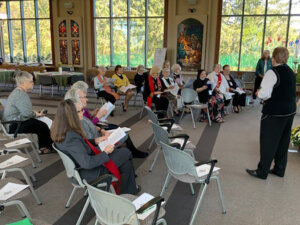
Guests at the ECW luncheon included the Rt. Rev. Geralyn Wolf, the diocese’s former bishop, who was a classmate of Drake’s at EDS, and the Rev. Elizabeth Habecker, a member of the Rhode Island Standing Committee, who was the first woman ordained to the priesthood in the Diocese of Maine. Wolf, the first woman to be elected bishop of the diocese, presided at the Eucharist preceding the luncheon, and Habecker was among those who offered reflections on their ministry.
Asked what she would say to women considering seminary and ordination today, Drake responded that she would say the same thing to a woman as to a man: “follow where you believe God is calling your heart. If it’s right, God will open the doors. … Happiness in life is in finding what you discern and believe. Follow what you discern is the best for us – what God wants for us. Pray for that – trust that God is going to bring you there.” She concluded by noting, “It’s all about the journey. It’s nice to celebrate the goals, but it’s the whole journey.”
Sacred Stories
Sacred Stories, a stained glass coloring book is now available on Amazon! Proceeds to benefit Episcopal Charities. https://www.amazon.com/dp/1960505866
2023 Convention Round-Up
The diocesan convention passed a $4.8 million operating budget that reflects a strong commitment to camp ministry and includes a 15 percent assessment of congregational operating income at its annual meeting on October 28, over Zoom.
In presenting the budget, Jim Segovis, chair of the finance committee, said that diocesan funds and congregational contributions made it possible for the diocese to support “life-saving, life-changing diocesan ministries, including a vibrant camp and conference center; college and young adult ministry; Hispanic ministry; responses to climate change; and ministry to unhoused people.”
The budget also includes funds to compensate the diocesan staff, furnish grants and loans to congregations, maintain diocesan property, and support “the churchwide and global ministries of the wider Episcopal Church and Anglican Communion,” he said. (Read a budget narrative.)
In his annual address, Bishop Nicholas Knisely urged the convention to consider the word “parish” in the context of the Episcopal Church’s Anglican heritage.
Churches founded by the Church of England “understand their congregation as the people who worship in the building and the parish as the people who live near the building,” he said. “The people who worship are gathered and sent to care for their neighbors, who are part of their parish whether they worship with them or not.
“We serve the community in which we are planted,” he said. “We serve the people who worship in the building, but not because they’re our loyal customers, though we fall into the trap often enough. We serve the people who worship in the building so that they are equipped and consecrated by virtue of their baptism to serve the parish in which we live.”
The budget is informed by an Anglican understanding of what it means to be a parish, Bishop Knisely said, using the $141,000 contribution from the operating budget to Episcopal Camp and Conference Center as an example.
“[T]he ECC subsidy is the largest part of our common work funded by parish assessments,” Bishop Knisely said. “That speaks to our commitment to this work and reflects its impact on the people who attend.”
Sixty percent of those who attend ECC camps are not Episcopalians, he said. “They are the people in our neighborhoods, not the people in our buildings.”
ECC’s camping programs survived difficult years at the depths of the pandemic, Bishop Knisely said, but they rebounded this summer. “This … tells me that ECC is a sustainable, life-changing program and ministry which we have made significant investments in over the past decade, and which I believe will continue to have an impact across the state and around the wider church.”
The diocesan budget also devotes $56,700 to campus ministry.
“I’m grateful that together we’re able to continue to engage young adults on a number of our college and university campuses in Rhode Island—not just in having identified chaplains on campus, but by having entire congregations recognize that it’s an important part of their local ministry,” Bishop Knisely said. “I’m hoping that in coming years we’ll be able to do more and coordinate the various programs more effectively.”
The bishop said he is also eager to find ways to relieve parishes and parish clergy of administrative burdens, perhaps through assistance with bookkeeping, payroll services and assistance in fulfilling legal and canonical responsibilities.
“I want to try to find ways to put you back in the mission field that we ordained you to serve, that we trained you to serve, and that you want to serve,” he told clergy.
“I want you to cultivate that community so that community can cooperate to solve the larger problems we are facing. And if you convert a few people, that would not be such a terrible thing.”
In other business, the diocese elected members to a variety of offices and confirmed appointments made by the bishop.
Delegates also approved the first reading of a constitutional amendment that would give the opportunity to speak, but not vote, at convention to officers of the diocese, members of diocesan commissions and other individuals selected by the bishop and approved by the convention.
A resolution that would have modified the nominating process for diocesan elections—in part by eliminating the requirement that nominees receive the endorsement of three members of the convention—was narrowly defeated.
The Rev. Dr. Andrew McGowan, dean of the Berkeley Divinity School at Yale, preached at the convention Eucharist on the evening October 27 at St. Luke’s Church, East Greenwich. Earlier in the day he gave a presentation on “True Bread: The meals of Jesus and the life of the Church” at St. Luke’s.
2022 Diocesan Audit and Financial Statements
The 2022 diocesan audit, more properly titled “The Financial Statements for the Diocese of Rhode Island as of December 31, 2022, with comparative totals for 2021, and the Independent Auditor’s Report” is here: 2022 Audit for Diocese of Rhode Island.
On the conflict in Gaza and Israel
On Tuesday, an airstrike at Al Ahli Arab Hospital in Gaza City reportedly killed hundreds of patients, healthcare workers and civilians seeking shelter. The hospital is operated by the Episcopal Diocese of Jerusalem.
The Archbishop of Canterbury, Justin Welby, released a statement today on the “atrocious attack” for which each side in the conflict is blaming the other.
This atrocity violates the sanctity and dignity of human life. It is a violation of humanitarian law, which is clear that hospitals, doctors and patients must be protected. For this reason, it’s essential that we exercise restraint in apportioning responsibility before all the facts are clear.
The evil and heinous terror attacks by Hamas on people in Israel were crimes against God and humanity. Israel has a legitimate right and duty to defend itself, and to pursue a proportionate and discriminate response to establish its security. The rules of war are there to safeguard civilians and the value of every human life. They must be upheld to the highest degree possible amidst the chaos of conflict, otherwise the cycle of violence will continue for generations to come.
Israel’s bombing campaign on the heavily populated Gaza Strip is causing massive civilian casualties and suffering. The people of Gaza are running out of water, food, medical supplies and places of refuge. Families in Israel and around the world still wait for news of their loved ones. It is unconscionable that aid is being prevented from reaching children and adults who are not combatants in this war. It is indefensible that hospitals, schools and refugee camps are being struck. It is an outrage that hostages are being held by Hamas. The bloodshed, slaughter and suffering of innocent people on all sides must stop.
Welby called for hostages to be released, civilians protected and a corridor for humanitarian aid to be opened in Gaza. (Read more.)
Presiding Bishop Michael Curry released a statement yesterday, calling the church to prayer for “for the birthplace of the Abrahamic faiths and for all its people.”
Pray this week for President Biden, that he may be an advocate for immediate humanitarian access for those who desperately need food, water, and medicine—and for comfort and consolation for those who have been displaced and those who are grieving loved ones.
Bishop Knisely offers this prayer for use in our diocese:
Holy One, we are in anguish witnessing the violence and suffering happening in the Holy Land. The scenes and the accounts are heart wrenching. Today we implore you to soften, to heal, the hearts of those consumed with anger and revenge. We pray for a cease-fire, we pray a for humanitarian response, and we pray for the diplomats working night and day to make both happen. We pray for our friends, and we pray for our enemies. We pray in the hope that by your grace, a new path might be possible. We pray this in the name of our Savior Jesus Christ. Amen.
The Episcopal Church’s Office of Government Relations is asking Episcopalians to urge their members of Congress to:
- Publicly call for a ceasefire, de-escalation, and restraint by all sides.
- Call on all parties to abide by the laws of war, including the Geneva Conventions and customary international law.
- Prioritize steps to secure the immediate release of hostages and ensure international protection for civilians
Take action via the Office of Government Relations website.
In a statement yesterday, the Episcopal Diocese of Jerusalem condemned the “brutal attack on the hospital. “As we grieve the loss of countless souls who perished on our premises, we declare a day of mourning in all our churches and institutions. We beseech our friends, partners, and individuals of goodwill to stand in solidarity, mourning with us the heinous assault on our dedicated staff and vulnerable patients.”
This morning, Archbishop Hosam Naoum gave a press conference regarding the bombing. It is available on Facebook. He disclosed that the hospital received warnings from the Israeli government to evacuate for three days before the strike but said he did not know who was responsible for the attack. (27 minutes)
Church for Middle East Peace, of which the Episcopal Church is a founding member, has released a statement on the bombing.
The Patriarchs and Heads of the Churches in Jerusalem have also released a statement. “We unequivocally declare this atrocity an egregious crime one demanding the severest censure and international accountability,” they wrote, calling on the global community “to embrace its sacred duty to shield civilians and to ensure that such heinous transgressions are never again permitted.”
- Donateto American Friends of the Episcopal Diocese of Jerusalem, which supports Al Ahli Arab hospital.
- Find prayers and resources.
- Read updates from the Episcopal Church’s Office of Government Relations
- Follow Episcopal News Service coverage.
What else can I do to give back?
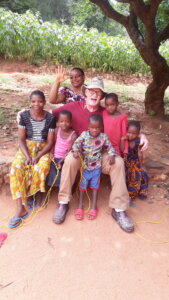 At 68 years of age, Rhode Islander Peter Bak found himself wondering what would come next. Retired after a successful career in business, he had spent three years making visits to nursing homes, hospitals, hospices, scout troops and more with Lucy, the first therapy-certified pit bull in the state. Still, Bak found himself looking for more.
At 68 years of age, Rhode Islander Peter Bak found himself wondering what would come next. Retired after a successful career in business, he had spent three years making visits to nursing homes, hospitals, hospices, scout troops and more with Lucy, the first therapy-certified pit bull in the state. Still, Bak found himself looking for more.
“What else can I do to give back? So many people have given so much to me: what else can I do?” he remembers asking himself.
When he expressed his quandary to the bishop’s staff, Bak was introduced to the Episcopal Volunteers in Mission program, part of the Mission Personnel Office of The Episcopal Church. He visited the church’s headquarters in New York while Elizabeth Boe, the Episcopal Church’s staff officer for global mission engagement, was in Tanzania, where the Rev. John Madinda, the principal of St. Philip’s Theological College expressed a need for someone to help people training for the priesthood learn more about how to maintain their churches. He also, he said, needed help maintaining the college’s building in Kongwa.
Bak didn’t need to be asked twice.
He began his ministry in Tanzania in 2018, making regular trips of two to three months each. Today his work still includes training future priests and work on the college’s building. But, he said with a laugh, he has learned that the most important skill is the ability to “always stay flexible,” since every day can include last minute surprises.
Bak’s work has expanded to connecting priests-in-training to the Bethesda Disability Program and teaching the school’s students how to use tools. Last year, he made a dozen cornhole games in Rhode Island and took them to Tanzania for the students in the Disability Program to paint.
His work in Tanzania is characterized by respect and love for the people he serves. “We mzungus (a term for white people in the Swahili language) are in their homeland and should be doing what they want,” Bak said. “I learned that the men especially liked my complimenting their work by calling it ‘supa.’ It caught on: ‘Supa work!’ Now, you can see groups of fifteen or twenty Tanzanian young men chanting ‘supa, supa, supa’ with a Boston accent.”
“Peter throws himself wholeheartedly into every experience,” Boe said. “He has built a great team at the theological college using his gifts of listening and responding to the situation at hand. He embodies what being a missionary in the 21st century is all about – building relationships, listening, learning, offering God-given skills.”
Bak is grateful to the Diocese of Rhode Island for support that has provided a new computer for the College’s top student and a new pump for the drip irrigation project. “Increasing the pump size has allowed us to grow more food.”
He encourages other Episcopalians to consider Episcopal Volunteers in Mission, a program for adults who are interested in living and serving in communities around the Anglican Communion.
“Don’t be afraid to do something new,” he said. “You may not have ever done it before, but that doesn’t matter – just be willing to learn. Before going to Tanzania, I hadn’t been out of the country except for trips to Canada. Going to Tanzania and learning to keep an open mind is a biggie. Just ask God for help to understand and work with the people there.”
Bak returned to Tanzania on October 3 and invites members of the diocese to follow his ministry on his blog. To learn more about Episcopal Volunteers in Mission, email Elizabeth Boe or fill out an online application.
Winter Shelter
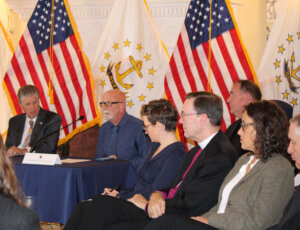 The Diocese of Rhode Island is joining an interfaith effort, coordinated by the state’s Department of Housing, to significantly increase the number of beds available to people living without shelter this winter.
The Diocese of Rhode Island is joining an interfaith effort, coordinated by the state’s Department of Housing, to significantly increase the number of beds available to people living without shelter this winter.
Bishop Nicholas Knisely attended a press conference last Friday at which Governor Dan McKee and Secretary of Housing Stefan Pryor outlined efforts to increase the number of beds available to Rhode Island residents who lack housing to 1,370 from last winter’s total of 789.
“I’m delighted to be involved in this initiative, not just because it’s helping the homeless, but because it’s a new model of collaboration between government and faith organizations,” Bishop Knisely said. “Homelessness is a complicated and multifaceted challenge. Responding to it and making a real impact is going to require creative and collaborative initiatives — like this.”
The state’s efforts include adding 318 beds to its shelter system, deploying rapidly deployable, temporary shelters of 30-45 beds known as pallet shelters, and developing a network of emergency hubs that can be opened when weather conditions dictate. These shelters would be available overnight to Rhode Island residents who lacked shelter or those whose homes had lost heat or power.
At the press conference, Pryor thanked Bishop Knisely “for already working with possibilities within the bishop’s constellation of Episcopal churches,” to develop the emergency network.
“These sites are expected to be a partnership between local government, churches and social service agencies,” the bishop said. “The congregations will be helping to fill gaps around the state where there isn’t sufficient shelter right now.”
A recent report by the Rhode Island Coalition to End Homelessness estimated that more than 1,660 people will be without shelter in Rhode Island this winter.
Other faiths and denominations are also active in the effort to provide shelter for those facing a winter living outdoors. Joining Bishop Knisely at the press conference were Monsignor Albert Kenney of the Roman Catholic Diocese of Providence, Iman Abdul-latif Sackor of the Islamic Center of Rhode Island, Imam Mufti Ikram Haq of Masjid al-Islam and Rabbi Sarah Mack of Temple Beth-El.
“I’m glad to that there has been such a broad response across denominations and faiths here in the state,” Knisely said. “Rhode Island is small enough that many of us know each other and when we were invited to be part of this initiative, we could build on those existing relationships to coordinate our plans effectively.”

